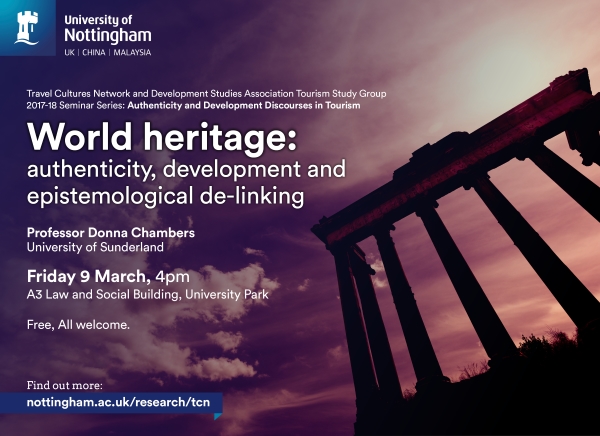World heritage: authenticity, development and espistemological de-linking

Travel Cultures Network and Development Studies Association Tourism Study Group. 2017-2018 seminar series: Authenticity and Development Discourses in Tourism.
Presented by Professor Donna Chambers, University of Sunderland.
It has been acknowledged that Small Island Developing States (SIDS), which include the Anglophone islands of the Caribbean, are the most under-represented in the world in terms of UNESCO World Heritage Sites and concerted efforts have been made over many years to change this situation. In fact, the wider Caribbean region forms a key part of the World Heritage Committee’s global strategy for a representative World Heritage List and a Caribbean Action Plan for World Heritage initially spanning the ten-year period 2004-2014 and redrafted and extended to the subsequent period between 2015-2019 has been developed as a means of addressing this under-representation of the region. These Caribbean Action Plans have resulted in more World Heritage Sites being designated in the region and of the 1073 properties on the World Heritage List as at 22 November 2017, 22 are in the Caribbean. Of this total five are in Anglophone Caribbean SIDS specifically Barbados, Jamaica, St Kitts & Nevis, St Lucia and Dominica. However, a look at the tentative list as at the same date, revealed a total of 20 properties across eight Anglophone Caribbean SIDS, indicting the potential for further growth in the number of World Heritage Sites in this region. The desire for global recognition through Word Heritage status thus shows no sign of abating and even The Bahamas, which was the last country in the Caribbean region that had resisted ratifying the UNESCO World Heritage Convention, was finally brought into the fold in 2014.
In this presentation we focus on the World Heritage Sites within these five Anglophone Caribbean SIDS and problematise the extent to which their representations are ‘authentic’ and the role they play in the (under)development of these countries. We question whether it is even desirable for these Caribbean countries, which are still struggling to come to terms with their post-colonial identities, to continue to subscribe to the discourse and practice of World Heritage which suffers from its own conceptual contradictions and which has been argued by several authors to be an inherently political and Eurocentric concept. Indeed, we go further to suggest that authenticity and development in these Caribbean SIDS might best be served through an ‘epistemological de-linking’ from the hegemonizing concept of World Heritage.
This is a free event. All are welcome.
Find out more at https://www.nottingham.ac.uk/research/tcn.
Tags: Development Studies Association, Professor Donna Chambers, Tourism Study Group, Travel Cultures Network, UNESCO World Heritage, World Heritage
Leave a Reply
Upcoming Events
Free webinar: How to grow your ‘growth mindset’
25 April 2024
Carbon literacy training: Tuesday 14 May 2024
14 May 2024


